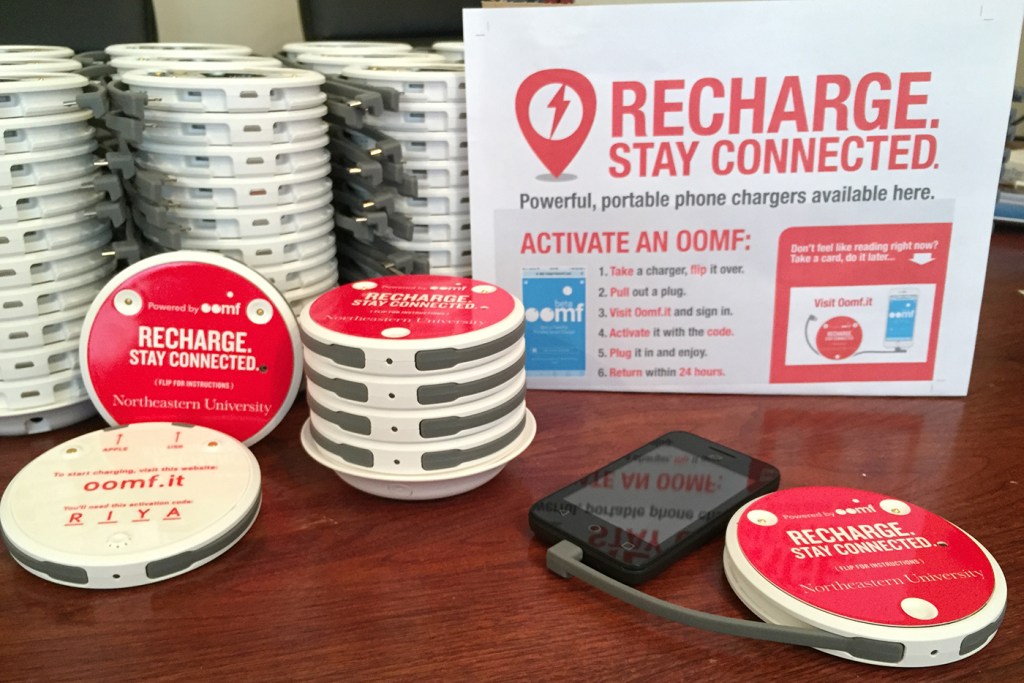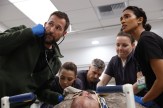Oomf there it is

The battery on your mobile phone is dead, but you don’t have time to charge it in your room. You’re running late and you have to catch the train. What do you do?
Beginning next Friday, swing by one of 30 campus locations and pick up the Oomf, a free portable smartphone charger. Just choose a cord that fits your phone, sign in to the Oomf app with your Facebook account or Northeastern email address, and then activate the device using the four-letter code on the back.
Enter your credit card number as collateral and then get to where you need to be, knowing that you’ll be able to text, tweet, and place calls to your heart’s content. Return the device to the so-called “PowerStation” where you picked it up within 24 hours and it’s free, or pay a $5 per day fee until you give it back.
“Portable power isn’t a convenience,” said Northeastern alumnus and Oomf co-founder James Riel, DMSB’13. “It’s a necessity to stay productive in today’s society.”
According to Riel, 300 Oomf’s will be available to the Northeastern community. They will be distributed to 30 campus locations in 12 different buildings, including Snell Library, Shillman Hall, and the Curry Student Center. Some buildings, including the Stetson East dining hall, will keep stacks of the devices in more than one location.
The trial program will run for several months, until students, faculty, and staff have collectively used the Oomf 50,000 times. The devices will be hooked up to Northeastern’s Wi-Fi network, allowing Riel to track usage. “We’ll be able to see how many are being used, for how long they’re being used, and where they’re being used,” he explained.
The Oomf is currently available at more than two dozen Boston businesses, from Game On to the Bradley & Diegel Salon. When you rent an Oomf from one of these establishments, you must either pay $1 or watch an interactive advertisement. Eventually the ads will be tailored to appeal to the specific user, with a particular focus on interests and demographics.
“We tell brands that we have a unique way of engaging with the millennial market, which has a great affinity for technology,” Riel explained. “Instead of paying a fee, they can engage with a fun and interactive ad in exchange for smartphone power.”
Riel has already received $625,000 from angel investors and is looking to expand Oomf to Philadelphia and New York City. He’s also partnered with Best Buddies of Massachusetts, becoming the official sponsor of its 2016 Boston Marathon charity team. As part of Oomf’s incipient Charge for Charity program, users have the option to pay the startup the typical $1 fee or donate the money to the state’s Best Buddies program, an advertisement for which is played when you rent the device from select locations.
“A lot of startups think that they can’t be charitable because of their limited resources,” Riel explained, “but it’s important to us that we’re able to give back at such an early stage of development.”
None of this would have been possible, he said, if not for Northeastern’s thriving entrepreneurial ecosystem. He credited his entrepreneurship classes, the entrepreneurial spirit of his peers, and the mentorship of entrepreneur-in-residence Bob Lentz for helping him build his business from the ground up. Lentz has been a particularly invaluable resource, he said, helping him design his business pitch, build strategic partnerships, and develop a cash flow analysis.
“I don’t think I could have done any of this without Northeastern,” Riel said. “I was always around people with great ideas and was able to look to my professors to get insight from conception to production.”





